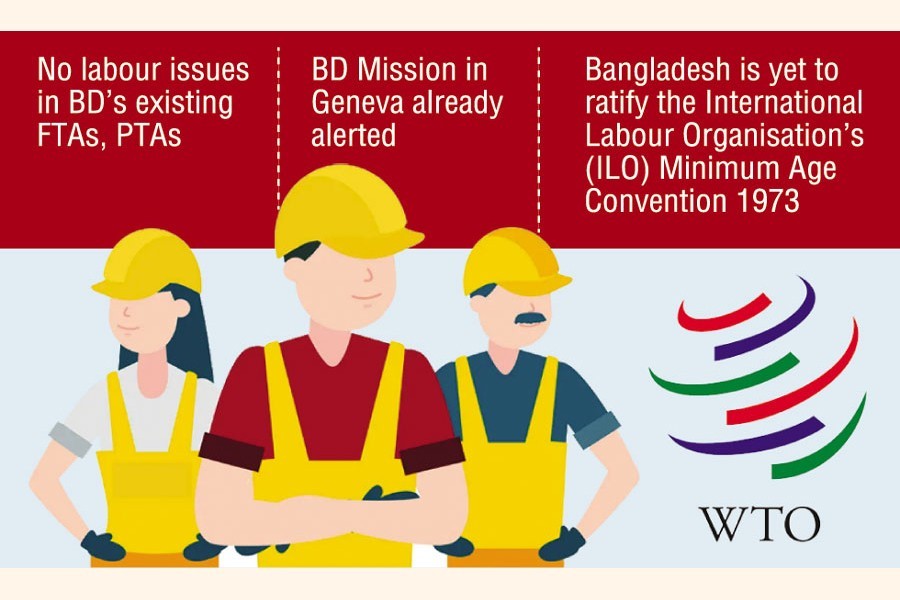Bangladesh does not want the inclusion of labour issues in any trade deal, contrary to the richer nations' view on the same, officials said.
In a recent preparatory meeting on the just-postponed ministerial conference of the World Trade Organisation (WTO), officials of the Ministry of Commerce (MoC) expressed their reservation on proposals for inclusion of labour issues in the WTO system.
The officials also sent a note to Bangladesh's Permanent Mission in Geneva, so that the issue is taken seriously and raised with the proper forum.
They said some of the wealthier members of the WTO proposed to add labour issues to the WTO objectives. Later, the WTO Secretariat forwarded the proposal to the member countries, seeking their opinions in this regard.
Meantime, the Bangladesh Tariff Commission (BTC) recently studied the requirements of reviewing the existing rules and regulations for signing free trade agreements (FTAs) and preferential trade agreements (PTAs).
The BTC found that there is no mention of labour issues in the country's existing FTAs and PTAs. On the other hand, various richer nations are keen to include labour issues in the FTA and PTA deals.
In this case, the BTC officials said strict pursuance of the labour law, especially the provisions of freedom of association, child labour, and labour inspection are very important.
They further said Bangladesh is yet to ratify the International Labour Organisation's (ILO) Minimum Age Convention 1973. They also emphasised the need for consulting the issue with the stakeholders concerned.
Hafizur Rahman, Director General of the MoC WTO Cell, told the FE that there are many organisations globally, including the ILO, which work on labour issues.
He said there is no law on labour issues in the WTO system, and no necessity is there to add labour issues afresh to it.
"We don't want labour issues to be dealt under the WTO system."
Mr Rahman noted that usually the rich nations include labour issues in their FTA and PTA deals, while the least developed and developing countries keep those away.
Bangladesh is a developing country, he said adding, "We do not have full perfection on labour issues, and we are unable to deal labour issues as per the American standard."
"We need more time to attain that standard," he added.
Khondaker Golam Moazzem, Research Director of the Centre for Policy Dialogue (CPD), told the FE that there was an attempt to include labour standard issue with trade in the first ministerial conference of the WTO in Singapore in 1996.
However, the issue was dropped that time in the face of reservations - expressed by some of the member countries.
"The labour issue was not included in the multilateral platforms. But, the trade deals, signed in regional and bilateral levels, include social, environmental, and labour issues."
Even transparency and accountability issues, which are usually not considered as trade issues, are now very much part of the trade agreements, said Mr Moazzem.
The FTA between the European Union (EU) and Cambodia is an example of inclusion of such issues in a trade deal. Even the proposed Trans-Pacific Partnership Agreement is also supposed to include labour issue in the deal.
Mr Moazzem opined that after graduation from the poor countries' club Bangladesh's future trade deals would be subject to inclusion of labour, social, and environmental issues.
"We don't have scopes to keep these clauses away," he said, adding even the EU's Generalised System of Preferences (GSP) Plus scheme would also require Bangladesh to comply with these pressing issues.


